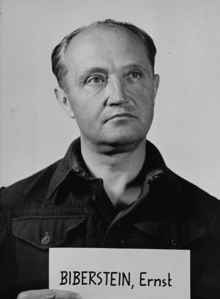Ernst Biberstein
This article includes a list of references, related reading or external links, but its sources remain unclear because it lacks inline citations. (February 2013) |
Ernst Biberstein | |
|---|---|
 Ernst Biberstein at the Nuremberg Trials | |
| Born | 15 February 1899 Hilchenbach, Province of Westphalia |
| Died | 8 December 1986 (aged 87) Neumünster |
| Allegiance | |
| Service/ | |
| Years of service | 1917-1919, 1936 – 1945 |
| Rank | Obersturmbannführer |
| Commands held | Einsatzkommando 6 |
Ernst Emil Heinrich Biberstein (or Bieberstein) (15 February 1899, Hilchenbach – 8 December 1986) was an SS-Obersturmbannführer (Lieutenant Colonel), member of the SD and commanding officer of Einsatzkommando 6. He was born Ernst Schzymanowski or Szymanowski.
Early life[]
Ernst Biberstein was born Ernst Szymanowski in Hilchenbach, Province of Westphalia. His early education was at Mülheim. He was a private in World War I from March 1917 to 1919. Upon discharge, he studied theology from March 1919 through 1921 and became a Protestant pastor on 28 December 1924. In 1935 he entered the and was later transferred to the Reichssicherheitshauptamt.
Nazism[]
Biberstein joined the Nazi party in 1926 and the SS on 13 September 1936 (membership number 272692). From March through October 1940 he was again a soldier. In 1941, he changed his name from Szymanowski to Biberstein. After the assassination of Reinhard Heydrich, he was assigned command of Einsatzkommando 6 in June 1942.
Nuremberg and later life[]
Biberstein was a defendant at the Einsatzgruppen Trial during the Nuremberg Trials. His trial began in September 1947 and ended on 9 April 1948. At his arraignment, along with all other defendants, he pleaded not guilty on all charges. Einsatzkommando 6 was charged with having executed some two to three thousand people. It was brought to light that at Rostow, Biberstein had personally supervised the execution of some 50 to 60 people. The victims were stripped of valuable articles (and partially of clothes), gassed, and left in a mass grave. He was also present at executions where victims were made to kneel at the edge of a pit and killed with a submachine gun.
Biberstein was ultimately found guilty and sentenced to death by hanging. His sentenced was reviewed by the "Peck Panel", and later commuted to life imprisonment in 1951. He was released in 1958 and temporarily returned to the clergy. He died in 1986 in Neumünster.
In media[]
Biberstein was portrayed in the 1978 NBC Holocaust television miniseries by Edward Hardwicke.
External links[]
- Eidesstattliche Erklärung, Dokument NO-4314 from NS-Archiv]
- The Einsatzgruppen Case Part I from the University of the West of England
- Biberstein photograph
- 1899 births
- 1986 deaths
- People from Hilchenbach
- Nazi Party politicians
- SS-Obersturmbannführer
- German military personnel of World War I
- People convicted by the United States Nuremberg Military Tribunals
- People from the Province of Westphalia
- German prisoners sentenced to death
- Prisoners sentenced to death by the United States military
- Einsatzgruppen personnel
- German people convicted of crimes against humanity
- Gestapo personnel